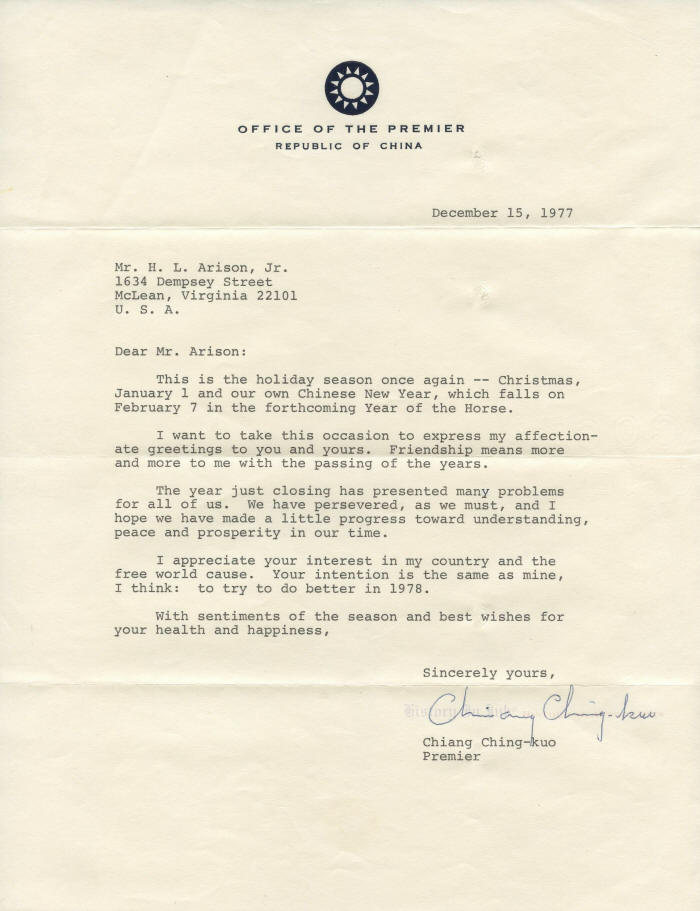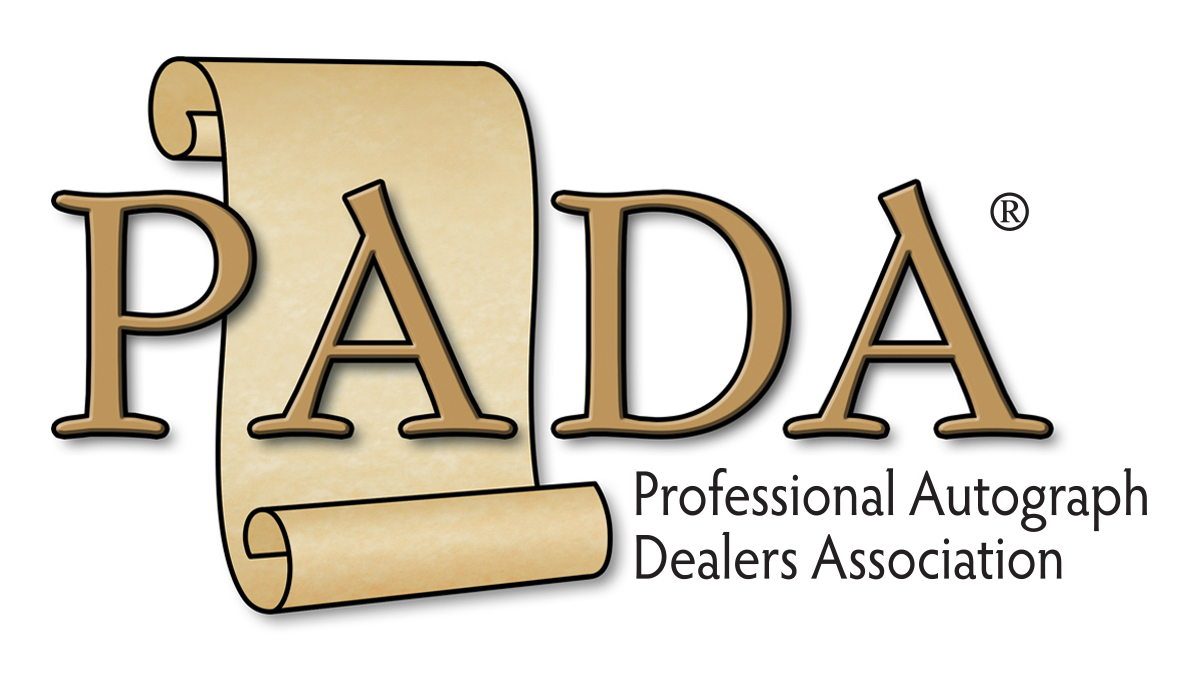2227415
Chiang Ching-kuo
Scroll down to see images of the item below the description
“We have persevered, as we must, and I hope we have made a little progress toward understanding,
peace and prosperity in our time. I appreciate your interest in my country and the free world cause.”
Chiang Ching-kuo, 1910–1988. Son of Chiang Kai-shek; 3rd President of the Republic of China, 1978–1988; 9th Premier of the Republic of China, 1972–1978; Minister of National Defense, 1965–1969. Typed letter signed, Chiang Ching-kuo, one page, 8½” x 11”, on stationery of the Office of the Premier, Republic of China, no place [Taipei, Taiwan], December 15, 1977.
This is an outstanding letter by Chiang. His salutary “affectionate greetings” for the holidays do not mask his concern over the issues of peace and “the free world cause” that weighed on his mind. Unspoken was his concern over possible American ties to Communist China. He mentions problems that he faced as Premier in 1977 and expresses his intention “to try to do better in 1978.” He would become President of the Republic of China some five months after writing this letter.
In 1977, the Nationalist Chinese were worried—as it turned out a year later, justifiably so—over the possibility that the United States would normalize relations with the Communist government of the People’s Republic of China and break diplomatic and military ties with Taiwan. In August 1977, Secretary of State Cyrus Vance spent four days in Beijing in what he and the Communist Chinese called “exploratory” talks toward full diplomatic relations. Communist Chinese Foreign Minister Huang Hua acknowledged his country’s social and ideological differences with the United States, but in his farewell toast to Vance, he focused instead on the countries’ mutual concern with repelling the Soviet Union: The “two sides have different ideologies and naturally there are differences of principle between us,” he said, “but in the present international situation our two countries face questions of common concern and have quite a few points in common.”
Some Communist Chinese were weary of delay but nevertheless believed that President Jimmy Carter would have difficulty persuading Congress and the American people that a switch in diplomatic relations to Beijing would not harm Taiwan. The Washington Post quoted a senior Communist Chinese foreign ministry official as saying that although Carter and Vance “say they support normalization, they won’t discount their old friend Chiang Ching-kuo.” Jay Mathews, Vance Visit Seen Soothing Chinese, Wash. Post, Aug. 27, 1977.
For their part, as this letter suggests, the Nationalist Chinese were nervous. The New York Times said that although “once many people evaded the question or simply shrugged it off, there are now tangible signs of nervousness, from government offices to Taipei’s flourishing new coffee houses and expensi[v]e high-rise apartment buildings.” It quoted postal authorities saying that, “for example, 200,000 people in Taiwan wrote letters to the White House in the summer, just before Mr. Vance’s trip, urging President Carter not to recognize” Beijing. Fox Butterfield, Taiwan Gets Increasingly Nervous Over Possible U.S. Ties to China, N.Y. Times, Sept. 13, 1977.
It was in the wake of this that Chiang wrote this letter. In full:
This is the holiday season once again—Christmas, January 1 and our own Chinese New Year, which falls on February 7 in the forthcoming Year of the Horse.
I want to take this occasion to express my affectionate greetings to you and yours. Friendship means more and more to me with the passing of the years.
The year just closing has presented many problems for all of us. We have persevered, as we must, and I hope we have made a little progress toward understanding, peace and prosperity in our time.
I appreciate your interest in my country and the free world cause. Your intention is the same as mine, I think: to try to do better in 1978.
With sentiments of the season and best wishes for your health and happiness . . . .
As it turned out, Chiang was rightfully concerned. It took another year, but on January 1, 1979, the United States terminated official diplomatic relations with Nationalist China and correspondingly established diplomatic relations with the Communist People’s Republic of China, thus recognizing mainland China as on the “sole legal government of China.’ Carter unilaterally abrogated the 1955 Sino-American Mutual Defense Treaty, which protected Taiwan from invasion by mainland China after the Communists under Mao Zedong came to power in 1949. Later, on April 10, 1979, Carter signed into law the Taiwan Relations Act, which provided for maintaining unofficial commercial, cultural, and other relations between Americans and the Taiwanese through a nonprofit corporation, the American Institute in Taiwan. Carter described the Act as “consistent with the understandings that we reached in normalizing relations with the Government of the People’s Republic of China. It reflects our recognition of that Government as the sole legal government of China.”
Chiang Ching-kuo was the oldest and the only biological son of Generalissimo Chiang Kai-shek, who ruled China until Mao’s Communist forces drove the nationalist government to the island of Taiwan. Chiang Ching-kuo was the Premier of the Republic of China at the time of his father’s death in 1975 and later succeeded him as President in 1978. He served as President until his death in 1988.
Chiang writes here to to H. L. “Lin” Arison, Jr., an America Army bandmaster who served as the Military Music Advisor to his father. The Chiang family and the Arisons became close friends during the Arisons’ time on Taiwan. We are separately offering other letters by Chiang Ching-kuo and an archive of letters by Madame Chiang Kai-shek to the Arisons. Click here and scroll down to see those listings.
This excellent-content letter by Chiang has never before been offered on the autograph market. Chiang has signed in black ballpoint. The letter has three horizontal mailing folds, one of which barely touches the top of the “h” in “Ching.” There are reciprocal thin spots in the paper above and below the date, and the letter shows scattered handling marks, including a light diagonal crease in the blank upper left margin. Overall, the letter is in fine condition.
Unframed.







